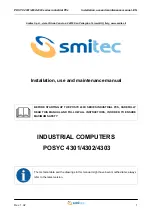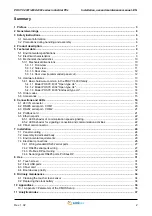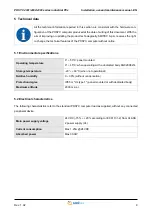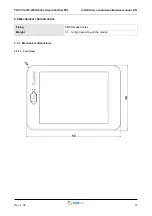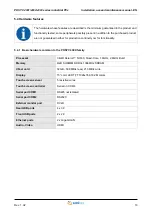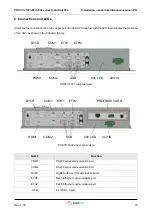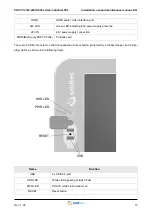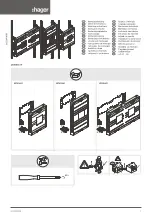
POSYC 4301/4302/4303 series industrial PCs
Installation, use and maintenance manual - EN
Rev. 1.02
7
4 Product description
The POSYC is a personal computer based on Intel®64 architecture designed primarily to facilitate human-ma-
chine interfacing (HMI) in an industrial environment, but its characteristics make it suitable also for different us-
es, such as information terminals and automation systems in gender.
The user interface mainly uses a flat color display and a touch screen pointing system integrated into the prod-
uct.
The 15-inch LED-illuminated TFT liquid crystal display with a diagonal dimension of 15" offers a considerable
display area, great brightness, color brilliance and a good viewing angle.
The touch screen system offers features of robustness and ease of use, difficult to obtain with other common
pointing devices such as mouse, track-ball and mouse pad.
Being completely integrated into the appliance, it is particularly suitable even in industrial applications that re-
quire resistance to external agents such as dust, humidity, water, oils, etc., which would be harmful for standard
devices.
Since it is sufficient to exert a slight pressure with a finger on its surface to make an immediate pointing, this
system is the main “User Friendly” feature of the POSYC computer.
In order to meet the most different interfacing needs, POSYC nevertheless provides the possibility to connect
also standard input / output devices, such as keyboard, mouse, track-ball, monitor, etc.
In its minimum configuration, the POSYC can communicate with the outside world via 1 standard RS232 serial
port and 1 RS485 port; it also offers 4 standard USB 3.0 ports, 2 IP65 USB 2.0 ports on the front, 2 10/100 /
1000Mb Ethernet ports, 1 HDMI port and 1 DVI-D port.
Depending on the version, a profibus card may be available in addition to the basic hardware of the POSYC
430X series.
The POSYC calculation capability is given by the Intel® Celeron ™ N3160 processor, Quad-Core, 1.6GHz with
4GB SDRAM DDR3L memory.
The storage of data and programs on non-volatile support is entrusted to a 32GB CFast card (high-speed flash
memory). The position of the device inside the POSYC is such that it can be extracted without opening it. The
main advantage of the CFast card is its exceptional resistance to accidental shocks and vibrations.
The new design makes it particularly attractive even for non-industrial applications.

